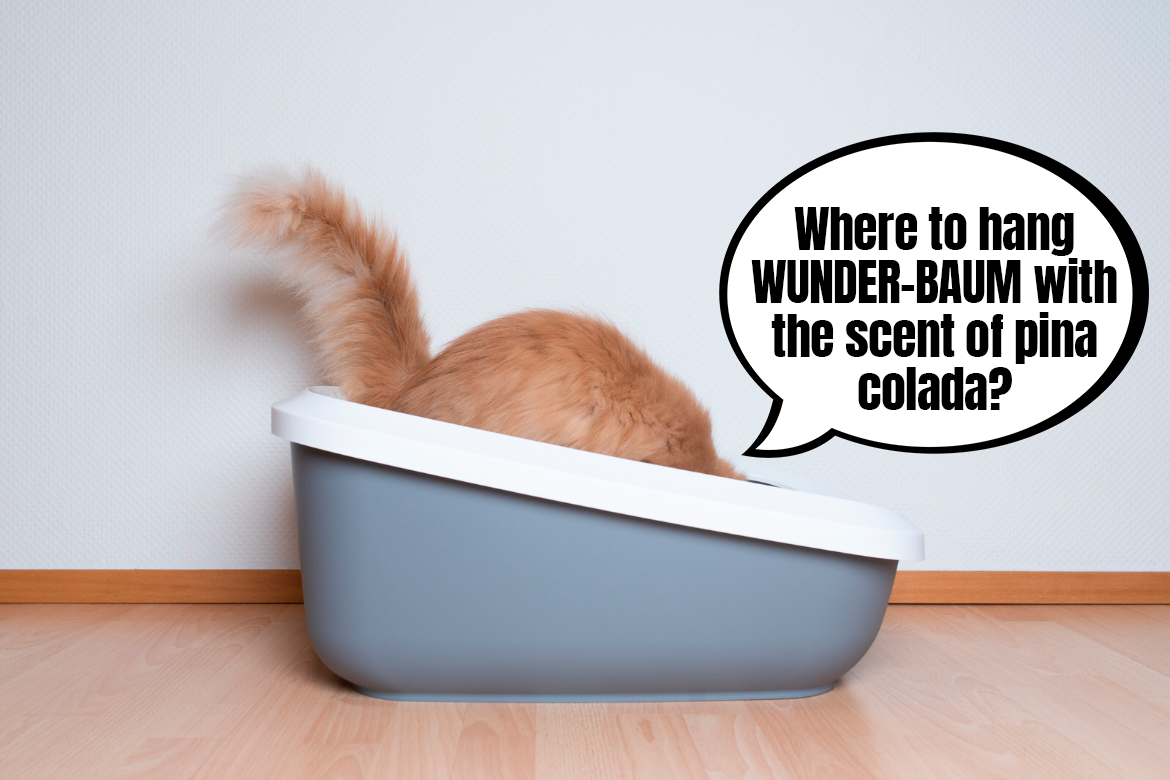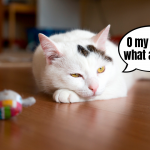If cats heard all the stereotypes saying they can’t keep up with their hygiene, their litter boxes being smelly, them marking their territory and the smell of their urine being suffocating from a mile away, they’d surely snort with laughter, purring: “go clean yourself hooman and then we’ll talk”. As cat Guardians you know very well, fabCats, that cats are in fact very clean and care about their personal hygiene. After all it’s cats who spend around ¼ of their day on cleaning and grooming their fur. Where did the myths come from then and when cat smells can actually be irritating? With a mission of saving cats’ honor, today we’ll be looking for all the answers.
Where does the ‘stinky cat’ stereotype come from?
One of the most important cat resources in the house is their litter box. Contrary to dogs who need to go outside to the toilet a few times a day, cats get a box filled with sand, litter or some other type of fill and they dig around in it to cover their poop. Cat litters are available in different sizes and types – from simple, plastic boxes to automatic litter boxes that clean themselves or smart devices providing vital information about your cats’ health. They all have one thing in common though – at home, they’re the cat toilet.
It’s not hard to imagine that a litter box which is not cleaned regularly will quickly become smelly and noticeable. However, that’s neither the cat’s nor the specific smell of their poop’s fault, but… lack of hygiene on the human’s part. Cats are not able to empty their litter box and take the bits to the bin outside. This is the cat Guardian’s role and cats expect their hoomans proper commitment to it. As a comparison, let’s imagine using the toilet by humans but without flushing. How quickly would we smell the stink coming from the bathroom? We can assure you it would be much quicker than you can smell bad smells from the cat’s litter box.
Cats – fluffy pedants under humans’ care
Cats love cleaning themselves and put a lot of stress on personal hygiene. After each meal, visiting the litter box or a nap they spend a lot of time grooming their fur back to purrfection. They clean their paws, faces, tummies and their private parts. If they don’t have any medical issues or troubles moving, they are able to keep their bodies as clean as necessary. But they do need help from their Carers – humans sometimes.
Some of the basic issues where the cat Guardian’s help is invaluable:
- regularly cleaning the litter box,
- health care,
- brushing (especially with long hair cats),
- oral care,
- biologically appropriate diet.
Everything mentioned above has an influence on the house smelling of cats or not. And the smell influences not only our own comfort, but the cat’s well being as well! What should we actually focus on?
When can cats get stinky?
Time for the meat. An unpleasant cat smell is most often caused by inappropriate diet and gastrointestinal issues, as those have a direct impact on any changes and irregularities as far as the quality and quantity of poops goes. Because of a bad diet, deficiencies, food allergies or parasites, cats can get constipated or have diarrhea, visit their litter box way too often or even take a dump outside the litter box. The diet also directly affects the smell of cat poop – with a good quality, meaty diet, the smell of a cat’s poop should be barely noticeable and non-irritating.
On the other side of the coin we have cat urine. This is the main offender for most cat Carers as it truly doesn’t smell good. Just as previously, however, we can impact the cats’ and our own comfort a lot by remembering about regular health checkups and proper prevention measures. Any changes when it comes to the smell or color of the urine could suggest a change in the pH or, among others, issues with the kidneys. If a cat is visiting their litter box way too often, drinks a lot, shows signs of pain or goes outside the litter box to pee, it’s necessary to get a vet check it up.
A smelly cat does not always have health issues. As it happens, a noticeable cat smell at home could indicate:
- behavioral issues (e.g. a stressed cat could go pee and poop outside the litter box or mark their territory),
- old age (that may cause the cat some issues with self-grooming or going to the toilet),
- lack of proper oral hygiene – if a cat’s teeth are uncared for, with ongoing inflammations or teeth that need to be removed, the smell coming out of the cat’s mouth can be really unpleasant. Moreover, if a cat isn’t fed a proper diet, their breath will be smelly compared to that of a cat fed a proper, meaty diet.
- issues that are not connected to the cat’s diet or their droppings,
Let’s remember that an unpleasant smell can be caused by bad oral hygiene (and ongoing inflammations of teeth and gums), allergies, skin and coat issues, untreated wounds and infections, as well as smells brought from the outside (if we’re talking about an indoor/outdoor cat or homeless cats).
Cat smells under the hooman’s control
And now, it’s time to play! Grab your scoopers, fabCats – we’re going on a litter box excavation. What can we, as cat Guardians, do to eliminate cat odours at home?
The litter box priority. A cat’s litter box should be cleaned regularly, even a few times a day, depending on the frequency of cats’ visits to the toilet and the number of cats at home. Let’s not limit the cleaning duties only to scooping out the poops and filling it up with fresh litter – find yourself a time slot (e.g. every two weeks) when you dump all the litter out, wash the litter box clean and disinfect it before filling it up again.
The more cats there are at home, the more litter boxes you should have. One box per 2+ cats is definitely not enough.
(Not) so random litter. The market for cat litter is growing bigger every month. Cat Guardians have a lot of choice when it comes to shopping, but we advise you to use common sense and have your cat’s comfort in mind – the litter shouldn’t be scented as the artificial aroma only irritates the cat and can, in fact, mix with the cat’s odours in surprising, unpleasant ways. Neutral options like unscented bentonite, wood or silicone cat litter will be the safest.
Start with the kitchen. The importance of a proper diet was mentioned before but let us reiterate it once again. What comes in through the cat’s mouth has to go out the other end and will always affect the end product’s aroma.
Remember about health. Regular check ups, poop, urine and blood tests, as well as teeth and overall health checks will always be a positive in a cat’s life and they can help you uncover some issues early on, which in turn helps to eliminate the issue of bad smells much quicker.
Cats love hygiene. As cat Guardians we don’t want to take it away from them! It’s good practice to be in a good relationship with our cats and notice any clues that they may give, as well as changes in their behaviour. And of course we should remember that we affect the smell of a cat at home the same, if not more than the cats themselves. How is it going to be, dear fabCats – who has already grabbed a smell-neutralising spray, a sponge and a scooper with a mission of cleaning the litter box? We’re waiting for your suggestions on how to keep it tidy around your fluffy friends in the comments section.




